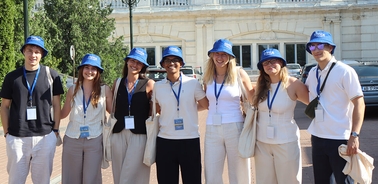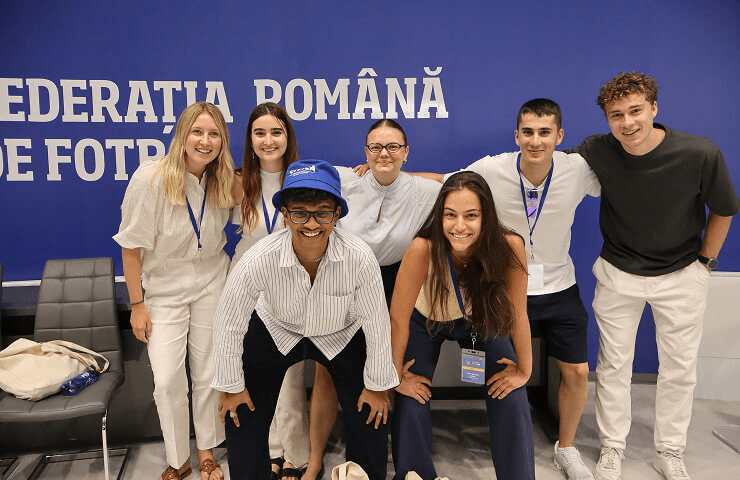- Home
- Civica
- Civica News
- Civica European Week: Discovering Europe Through Policy, Tech And Sustainability
CIVICA European Week: discovering Europe through policy, tech and sustainability

IE University student Fleur Caillé Méaulle shares insights from her participation in the CIVICA European Week, an experience of learning, dialogue, and discovery.
The CIVICA European Week is an annual event dedicated to connecting students and academia, and fostering cooperation and dialogue. The 2025 edition was held from the 23rd to the 27th of June at The National University of Political Studies and Public Administration (SNSPA) in Bucharest, Romania. The program brought together CIVICA and selected high school students, as well as students from Ukrainian partner universities. They enjoyed the insights of expert lectures and tutors from participating universities, which are leading social sciences institutions, including IE University, Bocconi, the Central European University, the National University of Political Studies and Public Administration (SNSPA), Sciences Po, the Warsaw School of Economics (SGH), the Stockholm School of Economics (SSE), and the London School of Economics (LSE). Fleur Caillé Méaulle was one of the attendees of this unique experience and here she shares some of her key reflections and takeaways.
When I applied to the CIVICA European Week, I was curious to explore how universities and students are building a common academic and civic space—what I like to think of as shared European intellectual and cultural heritage. As a student of Laws and International Relations at IE University at IE Law School and IE School of Politics, Economics and Global Affairs, with a strong interest in tech regulation and sustainability, I wanted to see how these themes are tackled beyond the classroom, in real policy conversations.
Held in Romania, the program brought us to the massive Romanian Parliament—the second-heaviest building in the world, and just as imposing as it sounds—and to academic panels hosted by SNSPA, where we dove into topics ranging from technological EU policy frameworks to concrete sustainability challenges. It also brought us enriching networking opportunities.
Beyond the academic insights, one of the most rewarding aspects of the week was connecting with people who share a genuine passion for shaping society through policy, sustainability, and digital governance. These aren’t niche interests. They are some of the most urgent and complex issues of our time. The fact that so many of our conversations naturally revolved around them was not only intellectually stimulating, but also a reminder that there’s a growing network of young thinkers across Europe committed to driving meaningful change.
One of the panels that interested me the most was a discussion touched upon how satellites are being used for ecological monitoring—a perfect example of how emerging technology can serve environmental goals, rather than being seen as an opposing force. Ioana Petrescu, ex Finance Minister and European Climate Pact Ambassador to Romania, explained how Earth Observation Systems can fix the blind spots as they are able to track emissions, land use and environmental harm independent and in real time. The use of new technologies like MethaneSAT shows how cutting-edge innovation is becoming central to ESG commitments. All week long, we kept coming back to this theme: that tech and sustainability aren’t competing priorities but should be deeply integrated in policymaking.
What also struck me was Romania’s unique position. Being an emerging market economy with relatively recent EU membership, it is a country full of energy and determination, with startups and institutions working hard to make the most of their EU membership. The many EU-funded projects we encountered were not just theoretical: they had real, measurable impacts on people’s lives.
To anyone curious about the European Union in practice—not just in theory— I am sure that the CIVICA European Week is for you. It’s hands-on, intellectually rich, and filled with brilliant minds from all over Europe. You work in groups, tackle real-world problems, and have fun while doing it. CIVICA’s experience, thanks to IE University, gave me not just a deeper understanding of EU governance and Romania’s evolving role in it—but also a renewed sense of why policy matters, and how we as students can help shape what comes next.
